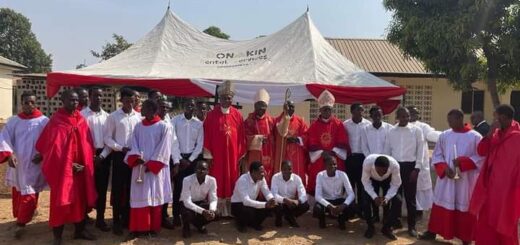SECOND PLENARY ASSEMBLY OF RECOWA-CERAO
PASTORAL MESSAGE AT THE END OF THE SECOND PLENARY ASSEMBLY OF THE REGIONAL EPISCOPAL CONFERENCE OF WEST AFRICA (RECOWA-CERAO)
0. Greeting and Introduction: Dearly beloved in Christ Jesus, we your Bishops at the end of our Second Plenary Assembly of the Regional Episcopal Conference of West Africa (RECOWA-CERAO), which we held here in Accra, Ghana from Monday, February 22 to Monday, 29, 2016, bring you greetings of the season.
We greet you in this special season of Lent in the Jubilee Year of Mercy for the universal Church (from December 08, 2015 to November 20, 2016), and in the Year of Reconciliation for Africa (from July 29, 2015 to July 29, 2016). This Second Assembly was attended by 120 delegates made up of Bishops, Archbishops and Cardinals, from all the 16 countries of West Africa, together with invited guests of the Regional Union of Priests of West Africa (RUPWA), and the Regional Union of Religious of West Africa (URCAO), the Regional Council of the Laity of West Africa (RLCWA) as well as from our several partner agencies such as the Catholic Relief Service (CRS), Missio-Germany, CAFOD of the UK and the United States Conference of Catholic Bishops (USCCB).
1. The theme of the Plenary: We, your bishops from West Africa, have spent this one week of Lent in prayer and reflection on the Word of God, celebrating the Holy Eucharist and worshiping the Lord in the Blessed Sacrament. We have also been privileged to listen to various speakers from home and abroad including the representative of the President of the Republic of Ghana, and the Apostolic Nuncio to Ghana representing the Holy Father on our theme for this plenary assembly, namely: “The New Evangelization and the specific challenges for the Church, Family of God in West Africa: Reconciliation, Development, Family Life”.
We have also taken time to listen to one another and share the rich experiences of our brother bishops, priests, religious, laymen and women; the joys and successes, pains, anxieties and challenges and opportunities open to our Church, Family of God in West Africa in the current socio-political and cultural development of the region. Coming together as bishops of the Catholic Church has been a kairos, a time of special grace from God. We feel very enriched and are most grateful to God for the gift of a unified regional expression of the Church universal.
As your pastors in the footsteps of Christ, Our Lord and Saviour, the Eternal High Priest, Good Shepherd and Teacher of salvation, at the end of our deliberations, we would like to share the following pastoral concerns with you, dear People of God, with our governments and with all men and women of goodwill living in our region.
2. Church: Family of God and the New Evangelization: Since the First Special Assembly on Africa of the Synod of Bishops which took place in the Vatican City, from April 10 to May 08, 1994, we accepted with the blessing of Pope St. John Paul II to work hard to make our Church become truly Church: family of God (see Ecclesia in Africa 63). We are still committed to working hard to make this model of Church a reality in our countries and beyond; and we have also embraced the Church universal’s call for the New Evangelization in the face of the rapid socio-cultural developments in the societies where the Church is called to bring the light of Christ Jesus in a new and more radical and transformational way.
This New Evangelization, which was first called for by the Servant of God, Pope Paul VI in his Post-synodal Apostolic Exhortation Evangelii nuntiandi 4, according to the official teaching of Pope Emeritus Benedict XVI when he set up the Pontifical Council for the New Evangelization in June 2010, is not a call to bring a new gospel, but rather to bring Christ Jesus and his timeless and yet always new message of salvation in response to the new challenges of the contemporary world.
The New Evangelization is therefore a call to bring the Good News of Christ Jesus as he mandated the apostles in Mt. 28:18-20 in a fresh new way, a more convincing way, a new and faith-filled way, by a life of authentic conversion and new witnessing in service to humanity. It is to be Christ-centered and the responsibility of all the baptized; it is to be directed not only to those who have never heard of Jesus Christ in primary evangelization, but also to those who have heard of and lost their earlier love for Jesus Christ and his Church; the New Evangelization is aimed not only at the individual, but more at a cultural transformation of humanity into the kingdom of God.
Dearly beloved in Christ Jesus, in our West Africa region, we are being called in the spirit of the New Evangelization to be evangelized and to evangelize through the empowering of all you the baptized to take up your roles as salt of the earth and light of the world wherever you find yourselves, be it in the families and in family life as married persons, in the public space as civil servants at the service of our fellow country men and women, in traditional and political as well as professional leadership, in the security service of our various countries etc.
The New Evangelization demands that like salt of the earth and light of the world, we in the Church penetrate all corners of human life and endeavour, and contribute our quota to the transformation and development of our villages, markets and towns, our countries, etc., bringing about the kingdom of God wherever we find ourselves and especially in our region and anywhere else.
3. Lent in the Year of Reconciliation and the Jubilee of Mercy: In this special season of Lent, especially in the Jubilee Year of Mercy and in the Africa Year of Reconciliation, we your bishops make our own the words of St. Paul to the Corinthians that “… whoever is in Christ is a new creation: the old things have passed away; behold, new things have come. And all this is from God, who has reconciled to himself through Christ and given us the ministry of reconciliation…entrusting to us the message of reconciliation. So we are ambassadors for Christ, as if God were appealing through us. We implore you on behalf of Christ, be reconciled to God. … For he says: ‘in the acceptable time I heard you, and on the day of salvation I helped you’. Behold, now is a very acceptable time; behold, now is the day of salvation”(2 Cor. 5:17-6.2).
Observing what is happening in our region and from listening to each other, we have come to realize that we stand more and more in need of Pope Francis’s message in calling the Jubilee of Mercy, and most especially in need of reconciliation in our Church as much as in our countries, in all aspects of public and social life. We again exhort you in the words of St. Paul, “we implore you on behalf of Christ, be reconciled to God”.
Dearly beloved, let us use this favourable season of grace, Lent in the Jubilee Year of Mercy and in the Africa Year of Reconciliation, to be converted and to be reconciled to God and to each other in Christ Jesus, our Reconciliation. Let us also become ministers of reconciliation and ambassadors for Christ, which we are by virtue of our baptism. In the words of Pope Francis, let us become “missionaries of God’s mercy” wherever we find ourselves. In fact, we your bishops offer ourselves to be missionaries of God’s mercy, ministers of Christ’s reconciliation and ambassadors of peace in any part of our region and beyond where there is tension, crisis or conflict and even wars, etc.
In this regard, we recommit ourselves to the work for peace before, during and after political elections in our region; furthermore we recommit to pursuing inter-religious dialogue for peaceful co-existence with our brothers and sisters of other religious traditions; we also reaffirm our solidarity with our Christian brothers and sisters who today are victims of various forms of religious persecution in Africa and other parts of the world; we pray for them and ask the powers that-be to ensure respect for the religious and fundamental rights of all.
4. Marriage and Family and Family Life: From our deliberations, we want to reaffirm that when a nation is not a people reconciled with each other and at peace with itself, true and holistic development eludes it. Furthermore, when in the society marriage, family and family life, that basic nucleus of humanity, is not guaranteed its proper development in peace, that society is condemned to socio-political, cultural and moral instability.
We are therefore very convinced that in the face of the current socio-cultural developments, the Church-Family of God must rise up and defend the truth about marriage and family life as God the Creator has given it (see Gen. 1 & 2; Mt. 19:1-6 etc.). We defend the inalienable dignity and rights of all persons, as children of God, created in his image and likeness; we must safeguard the rights of all, especially the most vulnerable in society such as those conceived (the unborn), the aged and infirm throughout earthly life to natural death.
We in the Church uphold and defend that marriage is a gift of God created for man and woman, nothing more and nothing less, and that all human life is sacred and must be respected, accompanied and supported, protected and defended from the womb to the tomb. We stand up for the culture of life and we are ready to defend it in the public spaces of our countries against the incipient culture of death being offered as development.
5. Concluding exhortation: Finally, we have recommitted ourselves to the better faith-formation of our Church members and pastoral agents. We admit that there is still a lot to do to strengthen some of our Church members in the Catholic faith and its practices. We encourage our Catholics to avail themselves of efforts for their on-going formation in order to equip them to take up their social and political as well as cultural responsibilities in their societies. We encourage our Church members not to shy away from the noble service of politics and political leadership. In fact, we deem it a duty that must be fulfilled in the spirit of Christ Jesus, who came not to be served, but to serve and to give his life in ransom for many.
With St. Paul we exhort you: “finally, brothers (and sisters), whatever is true, whatever is honourable, whatever is just, whatever is pure, whatever is lovely, whatever is gracious, if there is any excellence and if there is anything worthy of praise, think about these things. Keep on doing what you have learned and received and heard and seen in me. Then the God of peace will be with you!” (Phil. 4:8-9).




